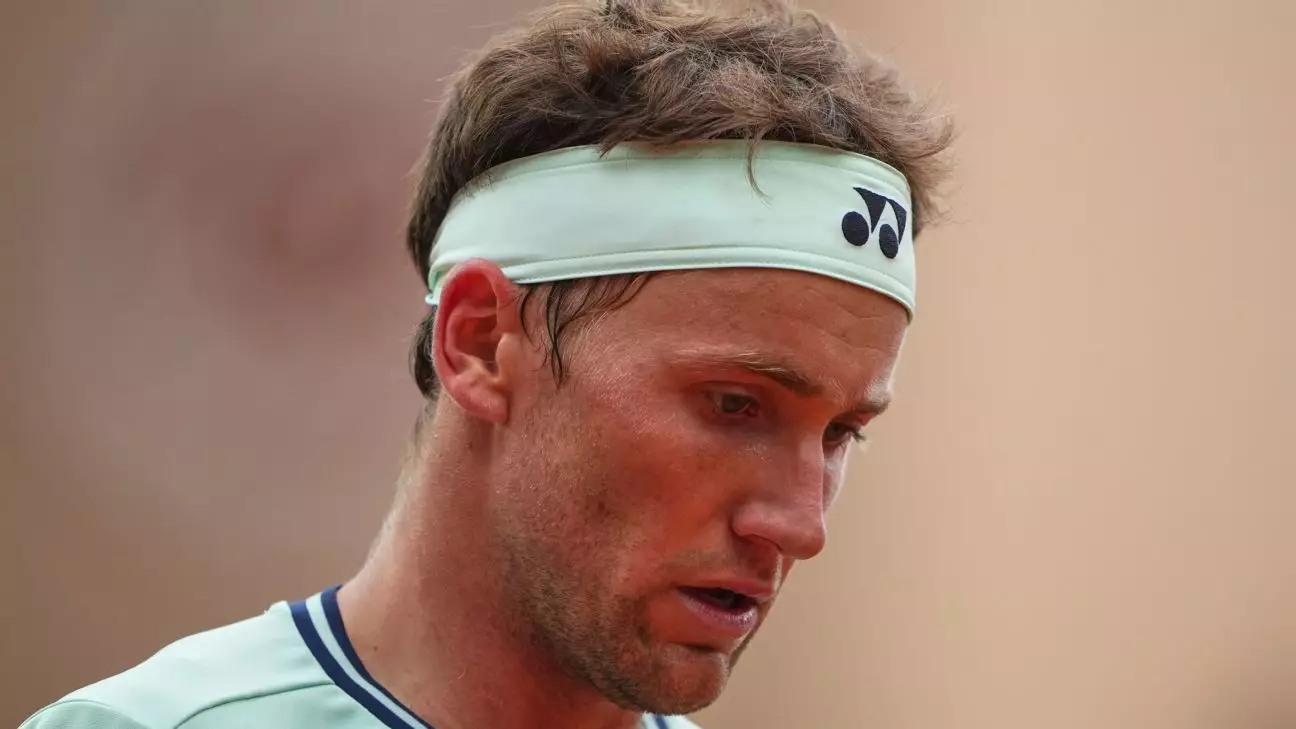The allure of Roland Garros—a hallowed ground where tennis champions are born—has been momentarily diminished for Casper Ruud. Once a regular contender in the latter stages of the tournament, the two-time French Open finalist faced a harsh reality when he suffered a debilitating loss to Nuno Borges in the second round. The match ended with a disheartening scoreline of 2-6, 6-4, 6-1, 6-0, reflecting not just a defeat but an immersion in physical hardship as Ruud battled through the pain of a troubled left knee.
It’s crucial to note this isn’t just a fluke or a minor bump on Ruud’s impressive trajectory; rather, it’s a chronic issue that has persisted and escalated during his clay-court season. The seventh seed, who made remarkable runs to the semifinals in the past three French Opens—including finals against the titans of the sport, Rafael Nadal and Novak Djokovic—has simultaneously dealt with ongoing discomfort that has significantly affected his performance.
The Weight of Expectations
Expectations were high for Ruud, not just from fans and analysts but also personally, as he aimed to better his previous outcomes on this iconic French soil. However, the reality of competitive sports is harsh; the physical toll can diminish even the most talented athletes. Ruud’s acknowledgment of his ongoing pain and medication reliance, through anti-inflammatory pills, paints an evocative image of an athlete grappling not just with an opponent on the other side of the net, but also with his own body.
In the opening set against Borges, it became evident that Ruud’s knee was a significant limitation. The vulnerability of his game was palpable—the very shots that once sculpted his play now seemed perilous and difficult, particularly his open-stance backhand. As he exploited his skills in practice, the need to adjust to his injury became a mental distraction, pulling him away from what is instinctual for a player of his caliber.
Borges’ Upset: A New Rise
In a twist of fate, Nuno Borges seized this moment of advantage, marking a milestone in Portuguese tennis history by advancing to the third round for the first time. His performance not only demonstrated skill but also perseverance against a visibly hampered opponent. The narrative of one player’s struggle serves as a dramatic backdrop to another’s ascent—a compelling demonstration of the unpredictable nature of sports.
Borges will next face Alexei Popyrin, who also advanced smoothly past Alejandro Tabilo, adding further interest to the mix as the competition heats up. The story of Borges stands in stark contrast to Ruud’s plight—a reminder that success often requires capitalizing on opportunities presented by the adversities of others.
Resilience Amidst Adversity
While Ruud’s defeat stings, it also illuminates an important aspect of athletic competition: resilience. Adverse circumstances can lead to transformative growth, both in physical recovery and mental fortitude. Ruud spoke poignantly about his desire to push through despite the pain—his determination to avoid shots that hurt him reveals a deep understanding of self-preservation in a demanding sport.
Despite seeking medical advice and taking time off before the tournament, Ruud found his efforts insufficient. Indeed, the struggle against an ongoing injury highlights the difficulty athletes face in balancing their competitive spirit with the requirements of their bodies. His sentiments of wishing he could stay in the tournament longer further illustrate the intensity of his passion for the sport.
Alcaraz and Musetti: The Next Generation Rising
While Ruud’s exit casts a shadow, the tournament continues to thrive with emerging talents such as Carlos Alcaraz and Lorenzo Musetti progressing with vigor. Alcaraz’s steady victory against Fabian Marozsan reassured fans, drawing on the confidence of past successes. As he advances, Alcaraz embodies the new generation eager to stake their claim on the legacy of tennis greatness.
Musetti’s straightforward win against Daniel Galan further solidifies the narrative of a changing guard in tennis. These young players are redefining expectations and injecting new energy into the game, ready to take the torch from giants like Nadal and Djokovic. Perhaps their rising presence offers hope for Ruud—demonstrating that while individual journeys may face setbacks, the spirit of tennis evolves and flourishes even amid adversity.
In this unpredictable sport, Ruud’s story serves as both a warning and a beacon; while the confines of physical limitations can be harsh, the pursuit of excellence continues unabated through the new talents slowly rewriting the fabric of tennis history.


Leave a Reply